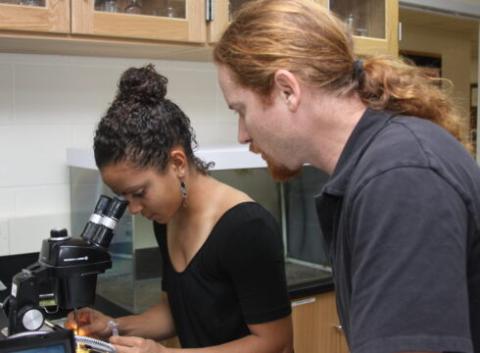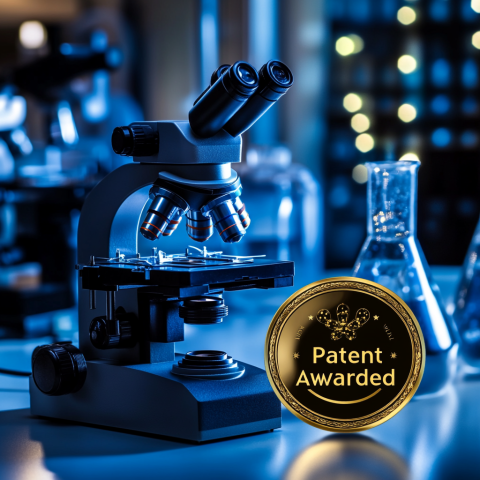Who We Are
NH EPSCoR advances New Hampshire's competitiveness in science and engineering by strategically investing in research infrastructure, promoting education in the STEM disciplines, and fostering partnerships with technology-based businesses that enhance job creation and economic development.
Our program is administered by the University of New Hampshire Senior Vice Provost for Research, External Engagement and Outreach, with oversight by the NH Research and Industry Council.
Our Projects
Explore our initiatives to expand research competitiveness in NH

NH-LIFT
Building research capacity by expanding research opportunities, student mentoring & training, and creating new partnerships among New Hampshire’s institutions of higher education and industry.

ENACTS
Leading research and workforce development on the design and implementation of Nature-based Solutions in three living hubs in Kentucky, Rhode Island, and New Hampshire.
News
NH BioMade Researcher Receives CAREER Award

NH BioMade researcher and assistant professor of chemical engineering and bioengineering Linqing Li has received NSF's prestigious CAREER award. This award will advance his work in hydrogels, sponge-like materials that can hold a lot of water and can be used for chronic wound healing, tissue regeneration, and as a model to study cancer invasions. His goal is to develop a simpler, more efficient way to create structured hydrogels using a sugar-based material system and a natural process called liquid-liquid phase separation (LLPS) — “a phenomenon similar to how oil and vinegar separate in salad dressing,” he says.
Seed Funding Available

NH-LIFT aims to foster a collaborative and inclusive research ecosystem that broadens participation, catalyzes innovation, and strengthens New Hampshire’s economy. To support this aim, NH-LIFT is offering two complementary seed grant funding programs intended to build and strengthen research collaborations across NH-LIFT partner institutions and lead to successful proposals for external funding. Apply now!
Cancer Immunology Co-op

Former NH BioMade grad student and UNH PhD candidate in chemistry Tran Truong just completed a 5-month co-op experience at Boehringer Ingelheim (Ridgefield, CT) in their Oncology Department. Tran is enthusiastic about her experience, noting she benefitted both as a scientist and collaborator.
Our Stories

Addressing the Complex Problem of Aging New England Dams
Hydropower dams in New England played a pivotal role in fueling industrial growth in the 19th and early 20th centuries, powering machinery in mills and factories throughout the region. Today, more than 50 hydropower dams in New England are slated for relicensing by the Federal Energy Regulatory Commission (FERC) in this decade. Deciding whether to remove, retrofit, or leave a dam intact requires evaluating a wide range of environmental, economic, and social factors.

Meet a LIFTER!
Meet Simon Pendleton, Assistant Professor of Practice, Environmental Science and Policy Program at Plymouth State University. Dr. Simon has joined the LIFT community as a faculty mentor to a SURE student intern. Already familiar with NH EPSCoR through a previous NSF EPSCoR award, Simon indicated he learned about NH-LIFT through the PSU LIFT PI, Eric Hoffman.
Our Impact in New Hampshire
The NH EPSCoR program office oversees NSF cooperative agreements for state-based research infrastructure projects, enhancing New Hampshire's research competitiveness. Across the state, these NSF investments have expanded research opportunities for faculty, post-docs, and students, strengthened academic and industrial collaborations, and increased expertise in various scientific disciplines. The initial $123 million in NSF funding has successfully attracted over $327 million in new research funding, enabling New Hampshire scientists to build upon their earlier discoveries.
Investment from NSF EPSCoR
NEW Research Funding LEVERAGED FROM NSF EPSCoR
Student & POST DOC Researchers
PEER REVIEWED RESEARCH PUBLICATIONS
Research Accomplishments
New Biomaterials Patent

NH BioMade researcher Kyung Jae Jeong was recently awarded a biomaterials patent, Injectable Porous Hydrogels, that describes different types of injectable hydrogels with large pores. These hydrogels are made by combining small gelatin particles with an enzyme, typically microbial transglutaminase (mTG). mTG promotes strong bonds between the gelatin particles, making it well-suited for cell growth and healing.
NH BioMade's Road to Building Better Materials
The goal of our Track 1 project NH BioMade (NSF Award #1757371) was to predict and control the composition, structure, properties, and function of biomaterials. This research was led by the University of New Hampshire in partnership with Dartmouth College and Keene State College. There were four research thrust areas: Composites for Orthopedic Bearings for Joint Implants, Sheet Metal Implants for Trauma Repair, Scaffolds for Tissue Regeneration, and Biocompatible Sensors for Use in the Human Body.
Collectively, NH BioMade provided research opportunities to 205 students and post-docs, who are now employed at engineering firms, in bioscience and chemical industries, as faculty members at high schools and universities, or are pursuing their advanced degrees.
Our final report is now available:
- NH BioMade Impact Report-071525.pdf (2.7 MB)
The roadmap below highlights the many research accomplishments of NH BioMade from 2018 through 2024.



